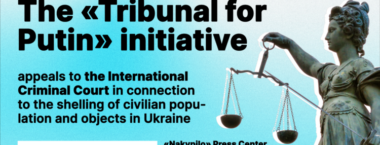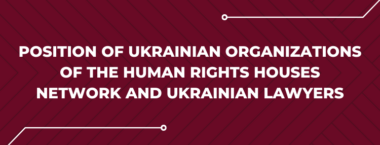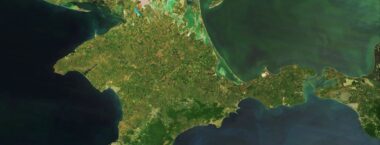The ongoing Kremlin-inspired armed conflict in eastern Ukraine has set a number of tasks before lawyers and human rights defenders – in particular, the need for clearer formulation of problematic issues revealed in course of documentation of war crimes and gross violations of human rights and better justification of claims against the guilty parties. The hybrid warfare makes this task even more difficult, since the aggressor state refuses to acknowledge its presence in Donbas, diligently concealing its role in the conflict. Hence, the fact that Russia has been controlling the illegal armed groups of the self-proclaimed “Donetsk/Luhansk People’s Republics” needs to be proven by Ukraine in the international judicial bodies, unlike the situation in Crimea, over territory of which Russia has already declared its responsibility.
A current report, released by the Ukrainian Helsinki Human Rights Union (UHHRU), presents and analyses evidence of the Russian Federation’s military support for the illegal armed formations of “DPR” and “LPR” in course of the armed conflict in Eastern Ukraine.
UHHRU, which has been collecting evidence of war crimes since 2014 and has already filed several submissions to the International Criminal Court, proposes to get familiarized with international principles and approaches to establishment of the responsibility of parties to an armed conflict for violating human rights and committing war crimes. It is stated, among other things, that each international court currently considering Ukraine’s applications against Russia (namely, the European Court of Human Rights, International Court of Justice and International Criminal Court) has its own criteria for proving one state’s control over the territory of another. In their turn, the report’s authors ground their own vision regarding Russia’s legal liability on the case-law of the European Court of Human Rights, which makes use of the “effective control” concept. In their opinion, the evidence should be collected in accordance with the ECtHR criteria for proving effective control over the “LPR/DPR”, namely, by proving that Russia has been providing them with military, political, financial and informational support.
The report focuses on evidencing Russia’s military support for the so-called “DPR/LPR” done through weapons supply, participation of the RF armed forces in hostilities, as well as organization and planning of military operations by Russia’s agents. Based on the open sources and UHHRU’s own data, the given analytical account spotlights involvement of not just Russia’s regular troops, but also of mercenaries from private military companies in Donbas-located conflict (for instance, “RSB-Group”, “MAR”, “ATK-Group”, “Slavonic Corps Limited”, “Wagner Group”, “ENOT CORP”, “Cossacks”), many of which have close ties to Russia enforcement agencies. The fact that the self-proclaimed “republics” own large numbers of modern weapons and vehicles also points to Russia’s involvement in the conflict in eastern Ukraine.
Therefore, the report, having examined current situation, makes the following recommendations to the Government of Ukraine on actions needed to be taken to prove Kremlin’s military support provided to the illegal armed formations of “DPR” and “LPR”:
The Cabinet of Ministers of Ukraine should:
- Initiate creation of the nation-level database as to foreign participants of the armed conflict in Ukraine, the materials of which meant to serve as the legal basis for the international legal assessment of the Russia’s actions in the territory of Ukraine and for bringing the Russian Federation and its high-rank officials to the international legal responsibility.
- Launch a coordinated work of the central level executive authorities on documenting, verifying and analyzing facts that prove Russia’s effective control over the territories of the so-called “DPR/LPR”.
- Initiate conduct of ongoing awareness-raising campaign by the government agencies, civil-military administrations and local authorities targeting general public to encourage them providing evidence of the Kremlin’s military support to “DPR/LPR”.
The Ministry of Foreign Affairs of Ukraine should:
- Take measures to level up political and diplomatic efforts of the international community with the aim of imposing criminal liability by the judicial bodies of foreign countries and international courts on individuals engaged into provision of military support to the so-called “DPR/LPR”.
The Main Military Prosecutor’s Office, the Security Service and the Ministry of Interior of Ukraine should:
- Ensure exchange of information to the fullest extent possible, which can be used as an evidence base confirming illegal presence of Russia’s military staff and citizens, weapons and equipment in Ukraine, and determining the amount of military support and persons responsible for its provision.
- Prepare and submit for the Cabinet of Ministers’ consideration the proposals on strengthening capacity of investigative units being in charge for international crimes investigation (as at least 3,500 Russia’s soldiers and mercenaries are involved in the conflict, against whom criminal proceedings might be instituted).
This publication is made possible by the generous support from the American people through the United States Agency for International Development (USAID) within the framework of the Human Rights in Action Program being implemented by the Ukrainian Helsinki Human Rights Union. The contents are the responsibility of the authors and do not necessarily reflect the views of the USAID or the United States Government.
The American people, through USAID, have provided economic and humanitarian assistance worldwide for over 55 years. In Ukraine, USAID’s assistance focuses on three areas: Health and Social Transition, Economic Growth and Democracy and Governance. USAID has provided 1.8 bln. technical and humanitarian assistance to Ukraine since 1992. For additional information about USAID programs in Ukraine, please visit our website: http://ukraine.usaid.govor our Facebook page at https://www.facebook.com/USAIDUkraine.



